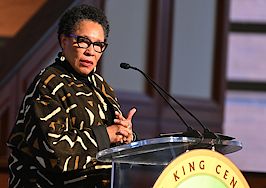In these times, double down — on your skills, on your knowledge, on you. Join us August 8-10 at Inman Connect Las Vegas to lean into the shift and learn from the best. Get your ticket now for the best price.
An Ohio bank has agreed to invest $9 million to promote homeownership in majority-Black and Hispanic neighborhoods in the metropolitan Columbus area, making it the sixth lender in the past 18 months to settle allegations by federal regulators that they engaged in redlining.
From at least 2015 to 2021, Park National Bank located its branches offices in the seven-county metro Columbus area exclusively in majority-white neighborhoods, the Department of Justice alleged in a Feb. 28 complaint.
Less than 1 percent of the mortgages PNB funded during that time period were made to homeowners in majority Black and Hispanic census tracts, compared to 7 percent of loans made by the bank’s competitors.
In settling with the Justice Department, PNB maintained that it “never acted intentionally to avoid serving the credit needs of borrowers in majority-Black and Hispanic census tracts or to discourage such borrowers from obtaining mortgage loans.” In a consent decree, the bank said it had already begun implementing reforms “to ensure that PNB was properly serving all of the communities in its footprint.”
PNB agreed to open at least one new branch and one new mortgage loan production office in majority-Black and Hispanic neighborhoods in Columbus, and invest at least $7.75 million in a loan subsidy fund that will be used to provide down payment, interest rate reduction and other forms of financial assistance.
To spread the word about the program and expand the pool of prospective borrowers, PNB will spend another $1.25 million on community outreach, advertising and partnerships.

David Trautman
“Park National Bank takes pride in our heritage of corporate citizenship, philanthropy, and compassionate support for all communities,” PNB Chairman and CEO David Trautman said in a statement provided to Inman. “We condemn discrimination in any form and stand firm in our commitment to providing equal access to credit for all borrowers. We look forward to creating even more opportunities for individuals and families to achieve the dream of home ownership.”
It’s the sixth settlement the Justice Department has reached since announcing an initiative to combat redlining in October 2021. The lawsuits have generated $84 million in relief, including a record $31 million settlement with City National Bank to resolve allegations that it avoided making home loans in majority-Black and Hispanic neighborhoods in Los Angeles County.
The Justice Department also reached a $20 million settlement with Berkshire Hathaway-owned Trident Mortgage Company in July and a $13 million settlement with Lakeland Bank in September.
Those settlements have yielded “substantial benefits for impacted borrowers and their communities,” said Assistant Attorney General Kristen Clarke, who leads the Justice Department’s broad federal civil rights enforcement efforts.

Kristen Clarke
“Our settlements are creating new home ownership opportunities for borrowers, particularly borrowers of color,” Clarke said at a press conference. “The down payment, interest rate reduction and other forms of financial assistance provided through the subsidy funds mandated by our settlement are literally opening the doors of homeownership to qualified borrowers.”
PNB metro Columbus branch locations, 2015-2021

Source: U.S. Department of Justice.
Chartered in 1908, Newark-based PNB operates 92 full service branch offices in four states: Ohio, Kentucky, North Carolina, and South Carolina.
None of the 20 branches PNB operated in the metro Columbus area during the period covered by the government’s lawsuit were located in majority-minority census tracks.
“While 19 percent of census tracts in Park National’s lending area here in the Columbus region are majority Black and Hispanic, the bank did not maintain a single branch in these communities,” Clarke said.
In its complaint against PNB, the Justice Department noted that all 73 majority-Black and Hispanic census tracks in the metro Columbus area are located in Franklin County, where PNB operated as few as three and no more than five branches between 2015 and 2020.
PNB’s branches in the metro Columbus market are concentrated in neighboring Licking County, which has no majority-minority census tracks. From 2015 through 2020, prosecutors said PNB operated between nine and 15 branch offices in Licking County.
Between 2015 and 2021, PNB had as many as 18 employees working to originate mortgages out of PNB’s main offices in Licking County, and up to 17 mortgage employees worked at the bank’s primary location in Fairfield County, the government alleged. But no more than 10 employees were assigned to originate mortgages at PNB’s Franklin County branches, prosecutors said.
Most of PNB’s outreach efforts in majority-minority areas wasn’t aimed specifically at providing mortgages, but consisted of sponsoring events and making financial contributions to local organizations, the complaint said.
PNB hosted more than 70 financial literacy courses in the metro Columbus area between 2013 and 2020, including homebuyer education programs. But only five were in majority-Black and Hispanic census tracts, the government said.
PNB metro Columbus mortgage originations 2015-2021

PNB didn’t pilot an online mortgage application process until 2019, prosecutors said, and the bank didn’t revise its mortgage banking policy to allow for online completion of home loan applications until 2020.
The results of failing to actively pursue mortgage borrowers by operating branch offices in minority neighborhoods came as no surprise to PNB, the government alleged.
From 2015 to 2021, PNB received a total of 13,437 mortgage loan applications in the metro Columbus area. Only 159, or 1.2 percent, came from prospective borrowers seeking a loan on properties located in majority-Black and Hispanic census tracts, the complaint said.
Over the same time period, competitors in PNB’s peer group generated 8.6 percent of their mortgage applications from majority-Black and Hispanic census tracts — more than seven times the rate of PNB.
Of the 9,602 residential mortgages PNB originated during the same period, only 88 — less than 1 perent — were made to residents of majority-Black and Hispanic census tracts. During the same time period, PNB’s peers made about 7 percent of their loans to residents of majority-minority census tracts.
“Although PNB has followed federal redlining enforcement actions for years, the bank failed to establish a robust risk management program during the relevant time period and did not compare its lending performance in majority-minority census tracts to that of other institutions with a similar volume of lending activity in each of its market areas,” prosecutors concluded. “As a general matter, however, PNB was aware that it underperformed its self-designated peers in generating home loan applications from majority-minority census tracts.”
In its consent order, the Justice Department said it notified PNB in November 2021 that it was opening an investigation into whether the bank had engaged in unlawful redlining in violation of the Fair Housing Act and Equal Credit Opportunity Act.
PNB cooperated with the investigation, and “the parties agree that the full implementation of the terms in this consent order will provide a resolution to the claims asserted in the complaint in a manner consistent with PNB’s legitimate business interests.”
As part of the settlment, PNB must conduct a research-based market study to identify the needs for financial services in majority-Black and Hispanic areas, and employ a full-time director of community home lending and development responsible for overseeing lending in those areas.
Editor’s note: This story has been updated with a statement from Park National Bank Chairman and CEO David Trautman.
Get Inman’s Extra Credit Newsletter delivered right to your inbox. A weekly roundup of all the biggest news in the world of mortgages and closings delivered every Wednesday. Click here to subscribe.













